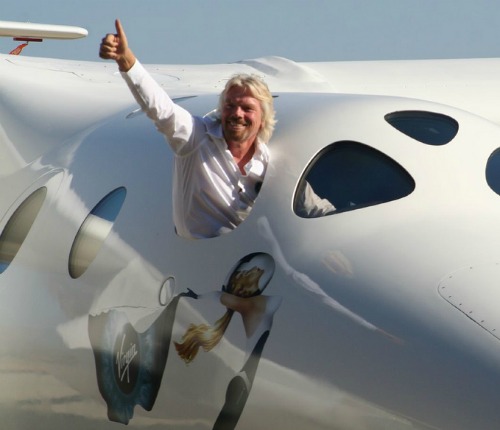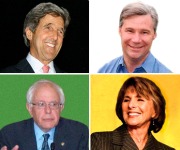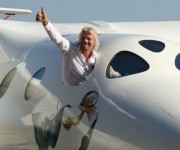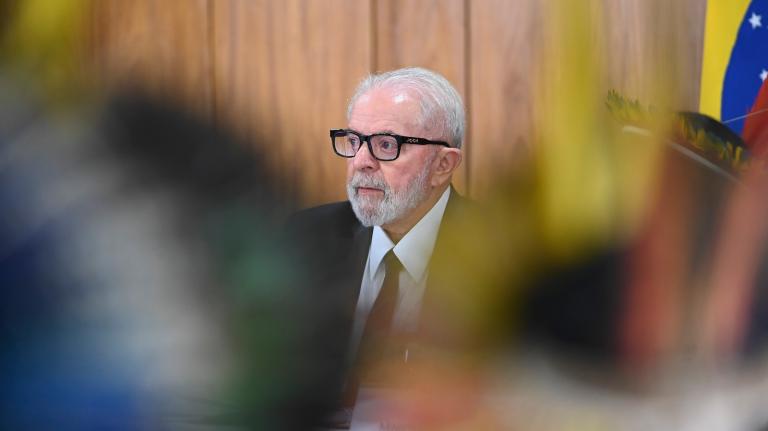 Sir Richard Branson in his WhiteKnightTwo aircraft.Photo: Dave Malkoff
Sir Richard Branson in his WhiteKnightTwo aircraft.Photo: Dave Malkoff
This story has been corrected and updated since its original publication. See below for details.
Here’s a new idea for how to deal with climate deniers: Blast them into space.
The proposal came yesterday during a freewheeling panel discussion among California Gov. Jerry Brown, Virgin Group Chair Sir Richard Branson, and Intergovernmental Panel on Climate Change Chair Rajendra Pachauri. Kicking off a conference on “Extreme Climate Risks and California’s Future” held at the California Academy of Sciences in San Francisco, Brown pledged to protect his state from the “huge problems” posed by climate change, including from efforts by climate science deniers to impede climate action.
“Our biggest problem is to deal with the skepticism and denial of the cult-like lemmings who would take us over the cliff,” said Brown, a Democrat, eliciting cheers and laughter from an audience of roughly 200 policymakers, businessleaders, and activists. “The skeptics and deniers have billions of dollars at their disposal … But I can tell you we’re going to fight them every step of the way until we get this state on a sustainable path forward.”
“It’s sad that in America you don’t talk about climate change because of Republicans,” said the British Branson, who described “exciting breakthroughs” in Virgin’s efforts to develop low-carbon aviation fuels. Showing particular promise is an algae-based fuel that, Branson said, could reduce aviation’s carbon emissions by 80 to 90 percent.
When Brown complained about officials from the US government’s housing agencies, Fannie Mae and Freddie Mac, who he said were obstructing California’s efforts to do energy efficiency upgrades on buildings, Branson joked that perhaps such officials should be given “a one-way ticket to space. I’ll be happy to oblige.”
That suggestion resurfaced a dozen minutes later when Pachauri, after lamenting the resistance of unnamed individuals and institutions to addressing climate change, commented, again in a joking tone, “Those who are becoming obstacles in implementing what is rational should be made the responsibility of Sir Richard [Branson] to give this one-way ticket to outer space. Of course space would be unfortunate to get some of these guys.”
Listing the threats climate change poses to California, Brown repeatedly emphasized water issues. The snow pack of the Sierra Nevada mountains, source of roughly 25 percent of California’s fresh water, has begun melting more quickly, he noted. That can lead to bigger floods, which threaten levees in the Central Valley and San Francisco Bay delta.
“The levees can break, and that is bad, real bad,” Brown said, since it could halt delivery of fresh water to the Central Valley — the source of most of the fruits and vegetables consumed in the United States — and to the businesses and millions of residents in southern California.
Meanwhile, added the governor, “the fire season, which has already lengthened in California by one month, will get longer. We’re going have to put more money into protecting ourselves, whether it be San Francisco and Oakland airports being underwater during extreme weather events, or [fires] in the Oakland Hills.”
“[Dealing with all] this is going to cost money, and the longer we wait to reduce carbon emissions, then the more expensive mitigation and the adaptation are going to be,” said Brown.
Closing the conference, Arnold Schwarzenegger, Brown’s predecessor as governor, dodged a question about the climate views of fellow Republicans running for president, but did criticize “simple-minded attacks like with Solyndra,” the solar company whose bankruptcy has been a favorite theme for congressional Republicans and Fox News in recent months. Critics use the Solyndra example “to say the entire solar industry is a failure,” complained Schwarzenegger, “even though at same time there were auto dealers that failed, fast food restaurants that failed, and no one talked about that” as proof that those industries were failures. He urged green proponents to talk about how “solar has really helped our economy [in California]. It’s grown 10 times faster than any other economic sector.”
Fresh from a movie set where he’d spent the afternoon “banging a guy’s head into the wall,” Schwarzenegger praised Brown for pioneering California’s pursuit of solar power and energy efficiency during his first term as governor, in the 1970s. “California is 40 percent more energy-efficient than the rest of the United States,” said Schwarzenneger. “I tell people in Washington, you don’t have to have any debates, just follow California’s example and you’ll be 40 percent more efficient. That would be the equivalent of closing 75 percent of all coal-fired power plants, which is like taking 300 million cars off the road.”
“We need to ease off using fuels [from] below the ground and increase use of fuels above the ground,” Schwarzenegger added. “In one hour the sun provides the equivalent of a year’s energy use by everyone on earth. Let’s use that energy!”
So, how does Brown propose to pay for his ambitious climate protection agenda? Noting that California is the eighth-largest economy in the world, the governor declared, “We have a huge amount of capital in California. This is not Greece … When something is important, you can find the money.” Referring to efforts to build a new home for the San Francisco 49ers, Brown added, “When a few people wanted to build a stadium to play 10 games of football a year, they found the money. If we can find $1 billion for relatively trivial reasons, we can find that money for more important things.”
The crowd applauded enthusiastically, overlooking how the governor had just conflated spending by investors seeking private profit with spending by government on behalf of the public good. That’s no small sleight of hand, given the severe budget problems in California. In 2009, the state briefly had to issue IOU’s when legislators could not agree on a budget; this year, Republicans’ refusal to increase taxes has led to massive cuts in education, health care, parks, and other public services.
Asked as he left the stage how he actually planned to pay for the climate actions he had just outlined, Brown told Grist, “I’m going to the people.” The governor hopes to place an initiative on the ballot next November that would authorize higher taxes on California’s wealthiest citizens. “Thousands of people have signed on, we’ve raised a couple of million dollars [to promote the initiative], and I’ll be raising more,” Brown said. “That’s how we’re going to do it, and I think we can win.”
No word yet on how much money will go to buying tickets for the denier crowd.
Editor’s Note:
This article by Mark Hertsgaard was criticized following publication by Rajendra Pachauri, the chair of the UN’s Intergovernmental Panel on Climate Change, who said that the article badly misquoted his remarks at the “Extreme Climate Risks and California’s Future” conference. Via email, Dr. Pachauri denied he said anything about giving climate change deniers “a one-way ticket to space.” That joking comment, Pachauri went on, was actually made by Sir Richard Branson, the chair of the Virgin Group, and it referred not to climate change deniers but to officials with the US government housing authorities, Fannie Mae and Freddie Mac, who were allegedly obstructing California’s efforts in energy efficiency. Branson agreed, through a spokesperson, that it was he who made the “ticket to space” comment.
Hertsgaard had sought, prior to publication, to verify the accuracy of his article by checking his notes of the discussion against video that had been shot of the conference and was supposed to be posted on Gov. Brown’s official website, but the video of that portion of the conference was not yet available. The video was, however, added to the website over the weekend, and Hertsgaard viewed it on Sunday afternoon Pacific Time.
The video shows that there were in fact two occasions during the discussion when the notion of a “one way ticket to space” was discussed. Branson and Pachauri are correct that on the first occasion (which comes roughly 40 minutes into the video), it was Branson who made the comment, and that he was referring to the federal housing officials. On the second occasion, at roughly 55 minutes into the video, it is Dr. Pachauri who reprises the phrase, though he does not direct it specifically at climate change deniers; indeed, it is not absolutely clear to whom Pachauri is referring when he says, again with a joking tone, “Those who are becoming obstacles in implementing what is rational should be made the responsibility of Sir Richard to give this one way ticket to outer space. Of course space would be unfortunate to get some of these guys.”
Hertsgaard and the editors of Grist regret not making the specifics of these two exchanges clear in the original version of the article. We have now revised and corrected the text to reflect the quotes documented by the video. Hertsgaard and the editors also apologize for any misunderstandings that may have arisen from the article. Finally, they remind everyone concerned that the comments in question were, after all, only a joke.



